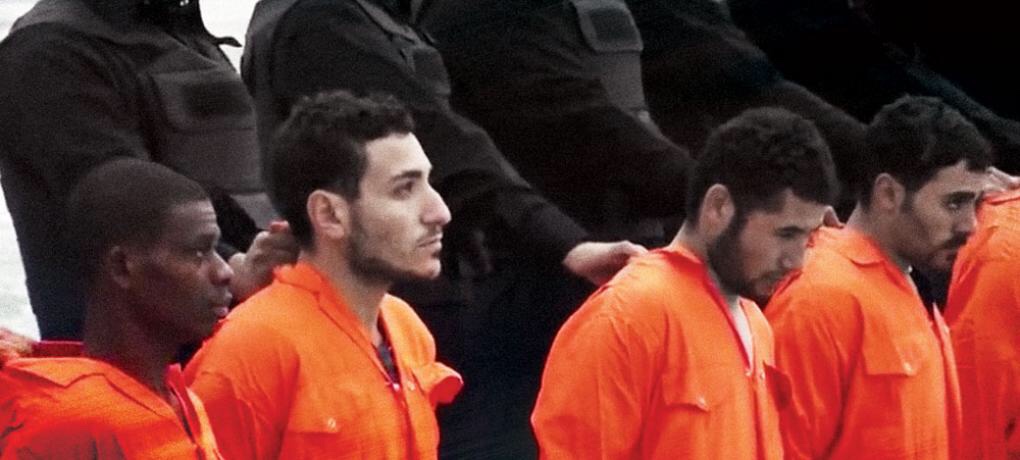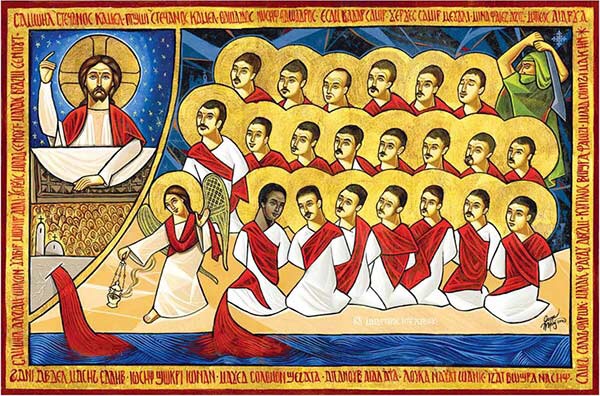
It is an honour to join you for this day of reflection as we commemorate again the martyrdom of the 21 saints who were brutally beheaded by Islamic State on February 15th, 2015.
When you asked me to talk today about the suffering of the Muslim Uighur people, I wondered how best to connect their plight with what happened on that beach in Libya.
There is the obvious link of suffering, the obvious link of persecution – both of which I will come to – but my starting point is a different one, it is the importance of solidarity: of standing in solidarity and common humanity with those who are persecuted.
A young West African, probably from Ghana, called Matthew Ayariga, is the personification and epitome of selfless solidarity.
Of the 21 who were murdered in Libya he was the one man who was not an Egyptian, not a Copt.
Some say that he wasn’t a Christian but, in seeing the bravery and extraordinary faith, of his Coptic compatriots he responded to the Jihadists, when they told him he would be freed if he rejected Jesus Christ, by saying that that “Their God is my God”.
An alternative report suggested that he may have come from a Christian background and said to his captors: “I am a Christian and I am like them”
It was so fitting that, in September 2020, Matthew’s mortal remains were taken to Egypt so that he could be buried, alongside those other remarkable men, in the church of the Martyrs of Faith bult in Al Our.
For me, the key point about Matthew Ayariga was that in a truly remarkable – supreme – act of solidarity he was willing to give his liberty and his life rather than walk away from his Coptic brothers.
What a contrast to our indifference to the persecution of 250 million Christians worldwide.
His act of extraordinary solidarity shames so many of us when we consider our tepid response – often based on political expediency, institutional considerations, or trade and business – to the persecution which is experienced by religious and ethnic groups the world over – discrimination that morphs into persecution; then persecution which morphs into crimes against humanity; and then ultimately into the crime above all crimes, genocide.
As you read reports of what is happening in Xinjiang, what word comes into your mind when you hear evidence of a State complicit in the destruction of a people’s identity; complicit in mass surveillance; complicit in forced labour and enforced slavery; complicit in the uprooting of people, the destruction of communities and families, the prevention of births, the ruination of cemeteries where generations of loved ones had been buried?
What word comes to mind when you hear of people being re-educated to believe that you, your people, your religion, your culture, never existed – and the certainty that through ethno-religious cleansing, you will cease to exist?
What word comes to mind when the Foreign Secretary tells Parliament he has been shocked by “the industrial scale” of 400 forced labour and concentration camps saying he had never again expected to see pictures of people being herded like animals on to trains ?
What word comes to mind on reading reports that 13 tonnes of human hair, has been taken from the shaved heads of Uighur people, exported to be used in wigs by those who are equally comfortable wearing fashion items made by Uighur slave labour?
How many heads would have had to be shaved to produce 13 tonnes of hair? Do the math.
An analysis of satellite imagery, of the Chinese Communist Party’s concentration camps, has identified what looks like a crematorium, with estimates there could be at least nine others.
The CCP says the camps are “educational and training facilities”. Precisely what purpose does a crematorium have in an educational facility?
Speaking to the BBC – who have now been banned for daring to broadcast interviews with escapees from the camps, one woman described how
“Some prisoners were hung on the wall and beaten with electrified truncheons. There were prisoners who were made to sit on a chair of nails. I saw people return covered in blood. Some came back without fingernails.”
She described one elderly woman whose skin had been flayed.
What word best describes these depredations?
I have seen reports that some prisoners have been used for medical experiments, with a witness saying: “some of the men become sterile. Women are routinely raped.”
What word comes to mind?
Despite the 1948 Convention on the Crime of Genocide – crafted by the Polish Jewish lawyer, Raphael Lemkin, after 49 of his relatives were murdered by the Nazis – the word which he coined is a word which too many States ensure does not dare to speak its name – unable to do so because of the erection of every possible obstacle in a steeplechase that denies access to justice and prevents – as it did for Yazidis and Christians in Northern Iraq – the use of the only word which truly describes the unrelieved and unmitigated horror which is genocide.
I began by speaking about the solidarity in which Matthew Ayariga stood with his Coptic brothers. He did so in an uncommon, atypical, display of common humanity.
The word genocide is an amalgam of Greek and Latin.
The Greek, genos, refers to who we are, while the Latin word caedomeans to cut or to kill. By contrast the word solidaritybinds us as one – and is a call to stand together in common humanity in the face of common threats and common enemies.
In politics it calls to mind the movement founded in Poland in 1980 under the leadership of Lech Walesa and which inspired popular opposition to the same ideology persecuting the Uighurs and which had spawned the gulags and mass murders of Joseph Stalin and his imitators across the Soviet Empire.
What is happening today to the Uighurs – and to Buddhists, Falun Gong, Christians, dissenters, journalists, and lawyers in China – is no different. It demands a sense of solidarity and a willingness to name things for what they are .
The Coptic tradition of Christianity has so much to teach us – not least their experience and understanding of endless centuries of discrimination, persecution, and martyrdom.
By contrast our pygmy like preoccupations are an embarrassment when confronted by their profound faith and sacrifice.
Heroic bravery in the face of evil demands a better response from us – even if it is only a pale imitation of the remarkable act of solidarity by Matthew Ayariga on that deadly beach in Libya in 2015



